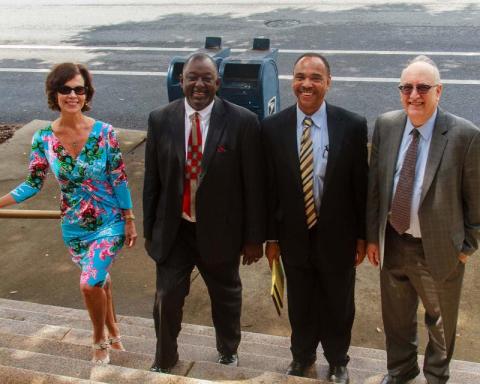I read an article in the NY Times last week that surprised me. It started out as a scathing, if somewhat predictable, exposé of the consequences of unfettered Republican rule in North Carolina and efforts by the GOP to solidify their agenda by employing voter suppression and gerrymandering tactics. What surprised me was that the Times, normally so quick to use stories of Republican malfeasance to project the Democrats as the “good guys,” concluded the article with the following:
"But voters now seem to be souring on both parties. While the number of North Carolina voters over all has risen since 2008, the number who are registered as either Republicans or Democrats has shrunk. Unaffiliated voters now make up more than a quarter of the voting population."
Many Republican legislators are pursuing voter suppression legislation with abandon. But the Democrats’ protestations are rightfully viewed with suspicion because they are a political party that supports gerrymandering, closed primaries, and the politicized administration of elections.
If you listen to the people of North Carolina, they are saying something profound: “we reject the Republican Party’s efforts to shove their agenda down our throats. We reject their efforts to limit participation and rig the game. But the Democratic Party is part of the problem, not part of the solution. That’s why we are becoming independent.”
Independents are not just growing in number. We are taking the lead in some of the most important democracy fights around the country. Two recent examples:
Last Wednesday, IndependentVoting.org president Jackie Salit and general counsel Harry Kresky traveled to South Carolina to defend open primaries from the Greenville County Republican Party, which has been attempting to force the state to enact closed primaries since 2010. After hearing arguments from both sides, Federal Judge Mary Lewis sided with the defendants and dismissed the case – a significant victory for open primaries advocates.
IndependentVoting.org issued a press release in the wake of the ruling, stating: "Political crossfire inside the Republican Party gave rise to this lawsuit but African American and independent voters would have been the big losers if the primaries had been closed as a result."
In California, Jason Olson of IndependentVoice.org is challenging third party leaders who continue to oppose Top Two nonpartisan primaries and want to nullify Proposition 14, which was passed by California voters in 2010. In an op-ed last week, Olson urges third party activists not only to abandon their opposition to Top Two nonpartisan primaries, but to take advantage of them. Yesterday he told me
“California's Top Two nonpartisan primary shifts power away from the partisan structure to the voters. That structure is overwhelmingly controlled by the party bosses of the major parties. That's why it's so crazy that the leadership of the third parties is actually defending the status quo, especially when Top Two could make third parties a real political force!”
I like that the NY Times is becoming hip to the fact that more and more Americans are leaving the parties and becoming independent. And, it is up to us—activist independents—to force them to cover how independents are not just growing in size. We are working to restructure the political landscape so that the people, not the parties, have the power.
Photo: On steps of the Donald S. Russell Federal courthouse in Spartanburg, SC (left to right): Jackie Salit, President of IndependentVoting.org; South Carolina Independence Party chair Wayne Griffin; local counsel Fletcher Smith, and IndependentVoting.org general counsel Harry Kresky.
